updated 3/28/16
Leadership
Vision Assignment: Option 2
===================================================
OPTION 2: HOW CAN I BECOME A BETTER LEADER FOR THE BENEFIT OF SOCIETY?
The basic question for this option is, "How can I become the kind of ethical person who can lead others for the benefit of society?”
In other words, your leadership vision should be less about short-term vocational goals, and more about how you can become an ethical eleader in any job, anywhere, any time, and justify the state's investment in you as a leader of a democratic society. It is more about the composition of self, the construction of character that is the traditional focus of a college education, as defined by Newman below
.----------------------------------------------------------------------------------
Personally, it should be more about the questions discussed above:
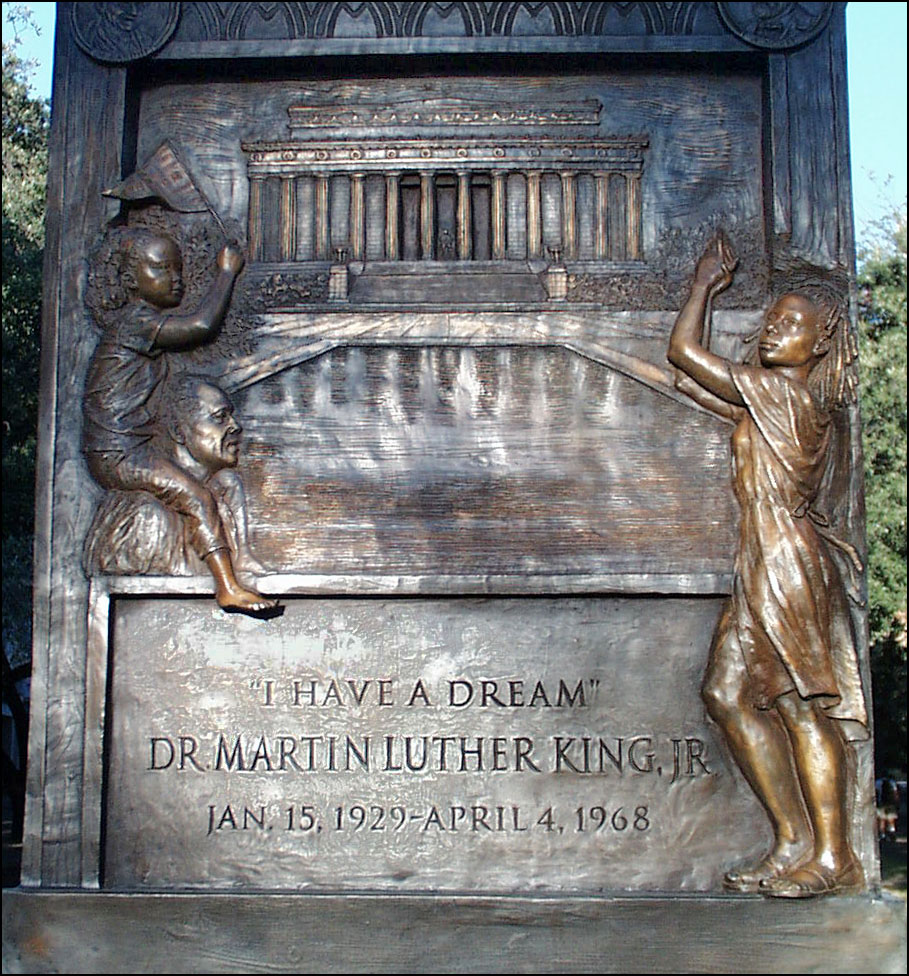
Martin Luther King was willing to die for his dream.
What dream are you willing to die for?
Š "What you would say to a visitor if, pausing by the statue of Martin Luther King, you were asked 'What is your dream?'?
Š If your life were to end now what would the torch represent that you would pass on to the next generation? What kind of article about you would you want to appear in TxTell: UT Stories?
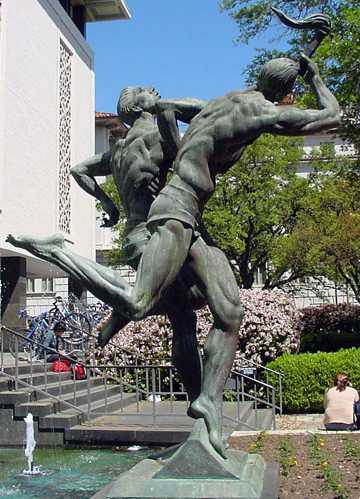
if your life were to end now, how would you have transformed lives for the benefit of society? What would the torch represent that you would pass on to the next generation?
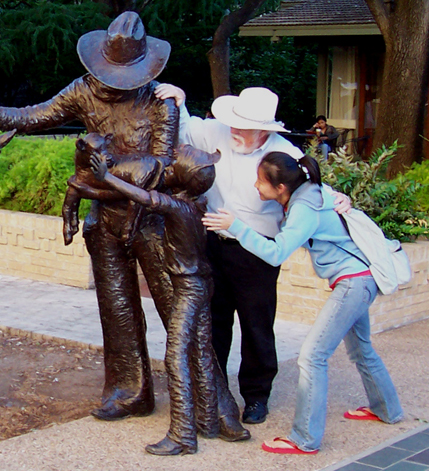
Š What would you, as the old cowboy in the sculpture, Generations, in front of the Texas Exes, say to the next generation?"
-----------------------------------------------------------------------------------
To make these questions come alive for you, you might want to begin your essay imagining a brief eulogy someone is delivering at your funeral seventy or eighty years from now: what would you want them to able to say about you, especially your leadership?
-----------------------------------------------------------------------------------
Role Models. Take a look at the U.T. role models [Texas Leaders ] and return to Discover the Leader in You. This time pay special attention to questions such as "Who inspires you? How would you become a leader like your hero?" Very important for many people is the section on role models and how they have exhibited leadership. What qualities do your role models exhibit that you would like to develop in yourself?
-----------------------------------------------------------------------------------
How can I write a coherent, unified, option-2 Leadership Vision?
Accept ambiguity and multiplicity at first. You may well have to accept the fact that you have many different character traits you want to nurture or many different goals, ranging from perhaps one you would be willing to die for, to major directions for your future, to short terms goals for this semester. In the process, you would be well advised to quote from Dass on “the Witness” (in our anthology) several times to make sure you are keeping the perspective of the big picture, always remembering that the trait, role, or goal you are discussing is but one of many possibilities radiating out from your center, from the core of your being. When you are considering which character traits you most want to develop, look over those traits listed in the table of contents of our anthology and review Goleman's essay on leadership and emotional intelligence.
In other words, this option focuses on the formation of your ethical "character," that is the basic goal of a liberal arts education. Sometimes the word "conscience" is used in this context: as in, what sort of conscience do I envision in my leadership. In The Idea of a University, Newman mentions some of the other character traits you may want to develop in yourself.:
When the intellect has once been properly trained and formed to have a connected view or grasp of things, it will display its powers with more or less effect according to its particular quality and capacity in the individual. In the case of most men [and women] it makes itself felt in the good sense, sobriety of thought, reasonableness, candour, self-command, and steadiness of view, which characterize it. In some it will have developed habits of business, power of influencing others, and sagacity. In others it will elicit the talent of philosophical speculation, and lead the mind forward to eminence in this or that intellectual department. In all it will be a faculty of entering with comparative ease into any subject of thought, and of taking up with aptitude any science or profession. ... He apprehends the great outlines of knowledge, the principles on which it rests, the scale of its parts, its lights and its shades, its great points and its little, as he otherwise cannot apprehend them. Hence it is that his education is called "Liberal." A habit of mind is formed which lasts through life, of which the attributes are, freedom, equitableness, calmness, moderation, and wisdom.... Moreover, such knowledge is not a mere extrinsic or accidental advantage, which is ours today and another's tomorrow, which may be got up from a book, and easily forgotten again, which we can command or communicate at our pleasure, which we can borrow for the occasion, carry about in our hand, and take into the market; it is an acquired illumination, it is a habit, a personal possession, and an inward endowment.
Finally, to achieve unity you might list some of your options at the beginning of your essay, but then narrow the focus on just one of these character traits/goals or at least just one cluster of related traits/goals, perhaps using Covey to identify your center.
-----------------------------------------------------------------------------------
“Only Connect.” As you write this essay, ultimately you will be hammering your self into unity. You will be composing yourself. The word "compose" connects "pose," that is "to place," to "con" ("together"), and its root meaning is thus "to place together," "To put together (parts or elements) so as to make up a whole" (Oxford English Dictionary).
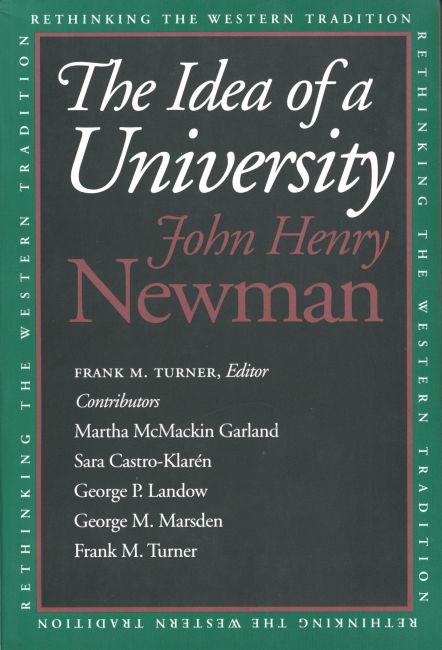
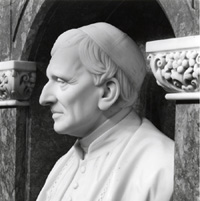
(Newman's idea of a university was based on his alma mater, Oxford, one of the primary sources of the leaders of the English-speaking peoples. It is no accident that its seal appears on the Main building:)

As Newman puts it in The Idea of a University, your mind takes a
"connected view of old and new, past and present, far and near, and ... has an insight into the influence of all these one on another; without which there is no whole, and no centre. It possesses the knowledge, not only of things, but also of their mutual and true relations." Such a mind "makes every thing in some sort lead to every thing else; it would communicate the image of the whole to every separate portion, till that whole becomes in imagination like a spirit, every where pervading and penetrating its component parts, and giving them one definite meaning. Just as our bodily organs, when mentioned, recall their function in the body, ... so, in the mind of the [student], the elements of the physical and moral world, sciences, arts, pursuits, ranks, offices, events, opinions, individualities, are all viewed as one, with correlative functions, and as gradually by successive combinations converging, one and all, to the true centre."